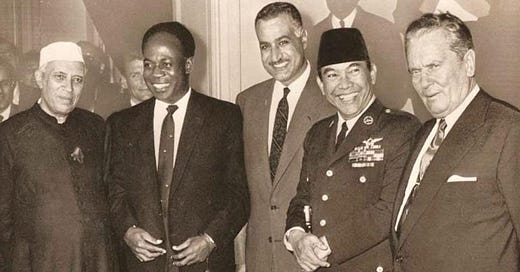India's role in the formation and sustenance of the NAM has been profound. Pandit Jawaharlal Nehru was not only one of the movement's founding figures but also one of the driving forces behind the principles that the NAM came to embody. The term 'Non-Alignment' was coined by India's Ambassador to the United Nations, V.K. Menon. Nehru's dedication to the NAM was influenced by India's experience as a newly independent nation, free from colonialism. This, along with the experiences of many other newly independent states, played a pivotal role in their decision to join the movement.
Emerging amid a Cold War world characterized by antagonism between the United States and the Soviet Union, the Non-Aligned Movement (NAM) served as a significant international diplomatic forum in response to the bipolar world order. The movement's history is closely tied to the aspirations of newly independent nations to maintain their sovereignty and independence, avoiding alignment with either of the two superpower blocs of the time.
The NAM's origins can be traced back to the 1955 Bandung Conference, officially known as the Asian-African Conference which brought together 29 countries from Asia and Africa. Its primary objective was to address common challenges faced by newly independent nations, such as decolonization, economic development, and the avoidance of military alliances with the superpowers. The Bandung Principles laid the foundation for the NAM's core principles.
Throughout its existence, the NAM has played a significant role in various ideological conflicts, such as staunch opposition to apartheid governments and support for guerrilla movements in various regions, including Rhodesia and South Africa. With the end of the Cold War, the NAM's original rationale diminished. However, the movement continues to evolve, focusing on issues like economic development, human rights, and the promotion of a more equitable global order. It has adapted to the changing international landscape and broadened its scope to address contemporary challenges.
As long as the global economic gap persists between first-world and third-world nations, the NAM remains relevant in the current world order, even as its political focus has shifted toward economic issues. While the loudest current rhetoric from the NAM is anti-west, its member governments show great ideological diversity across the spectrum. Both conservative Columbia and leftist Venezuela have recently hosted NAM conferences. So have pro-western Malaysia and socialist Cuba. But a third-world nationalism and opposition to Western hegemony is perhaps the most consistent theme of NAM statements. The most recent NAM Summit took place in Baku, Azerbaijan, in 2019, and the upcoming NAM Summit is scheduled for Kampala, Uganda, in 2024.



